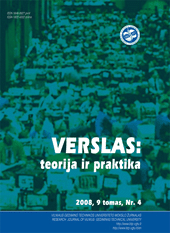Informacinių technologijų sukeliamų apskaitos pakitimų tyrimas
Accounting for Changes in Information Technology Use Tes
Author(s): Jonas BukevičiusSubject(s): Economy
Published by: Vilnius Gediminas Technical University
Keywords: accounting; information technology; accounting skills; accounting organization; accounting services firms; accounting software
Summary/Abstract: The latest computing technology, the application of information technology (IT) to accounting pose new challenges for the same records and how they are organized. There are additional requirements for the accounting staff, formation of accounting service companies, special software products developed for accounting management which are likely to create a new organization of accounting in Lithuanian enterprises. However, the recent introduction of information technologies do not always lead to development of accounting. As a result, after the introduction of the records of the latest information technologies, accounting development trends are not always observed in practice. The cases are often observed when this leads to an increase in workload of accounting staff. The problem of internal control system for using computer software emerges additionally. The new terms will also appear such as qualified accountants’ assessment problems, public accounting services start-up control. In organizing the public accounts activity we need to observe the diversity of accounting software products. The paper reveals the nature of the trends mentioned in the records, the relevant accounting issues, the proposals for their decision. As an option, it is recommended to start public practicing accountants attesting carried out in public, professional organizations of the country. Furthermore, it is recommended to start the accounting services business licensing, to organize their control system. It is also proposed to introduce into accounting the software product certification so that consumers can trace their qualified diversity.
Journal: Verslas: teorija ir praktika
- Issue Year: 2010
- Issue No: 1
- Page Range: 70-76
- Page Count: 7
- Language: Lithuanian

